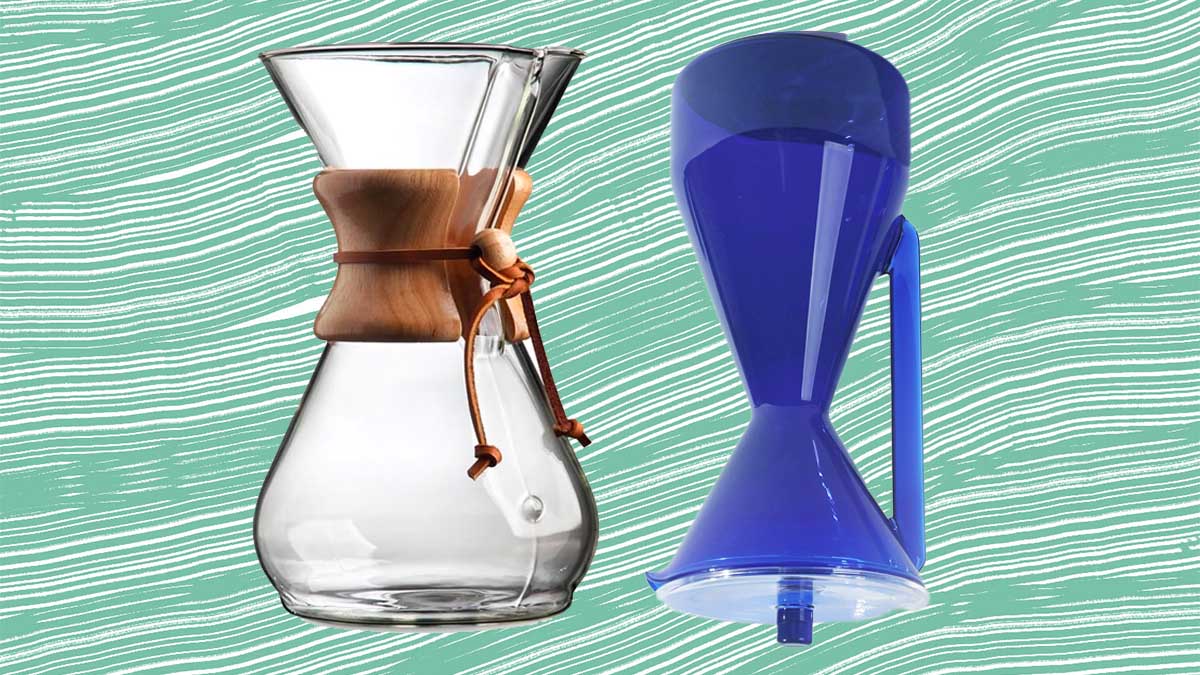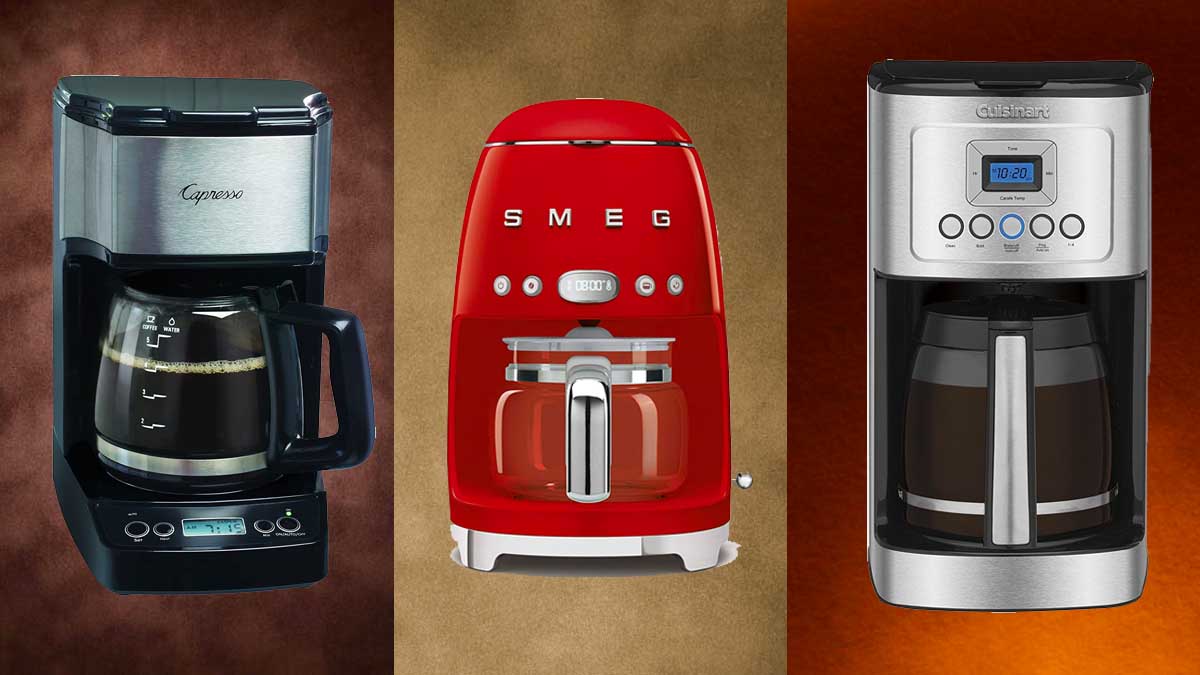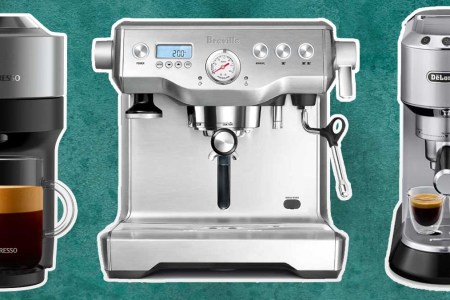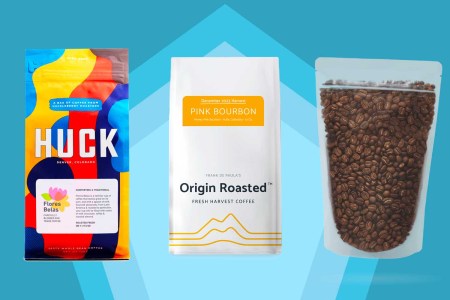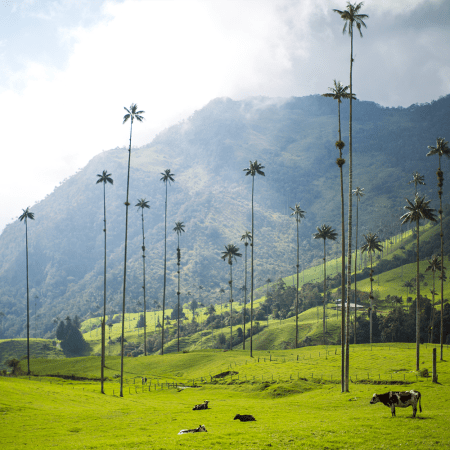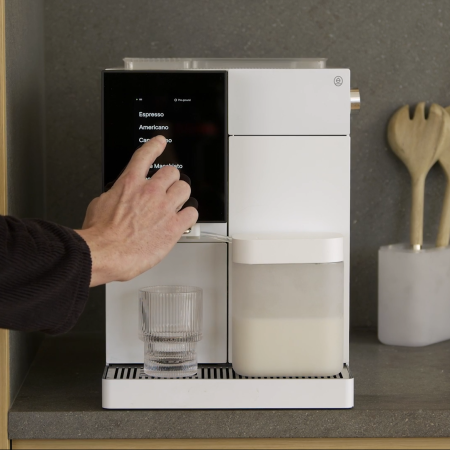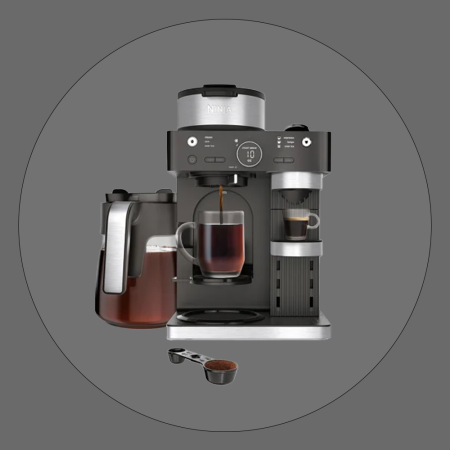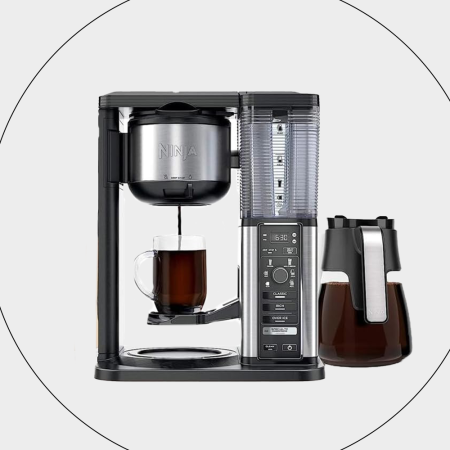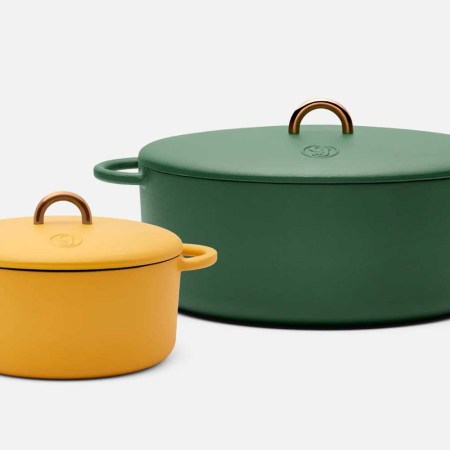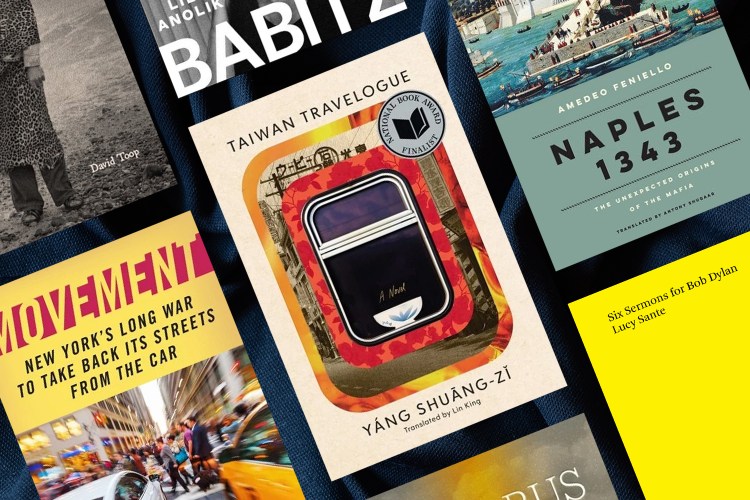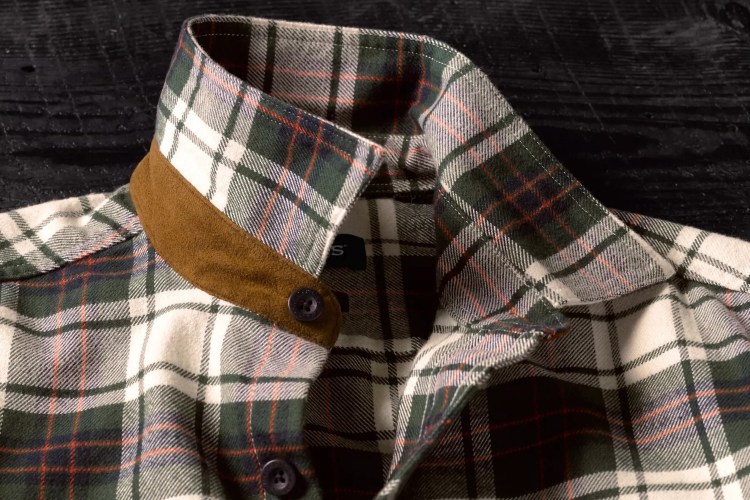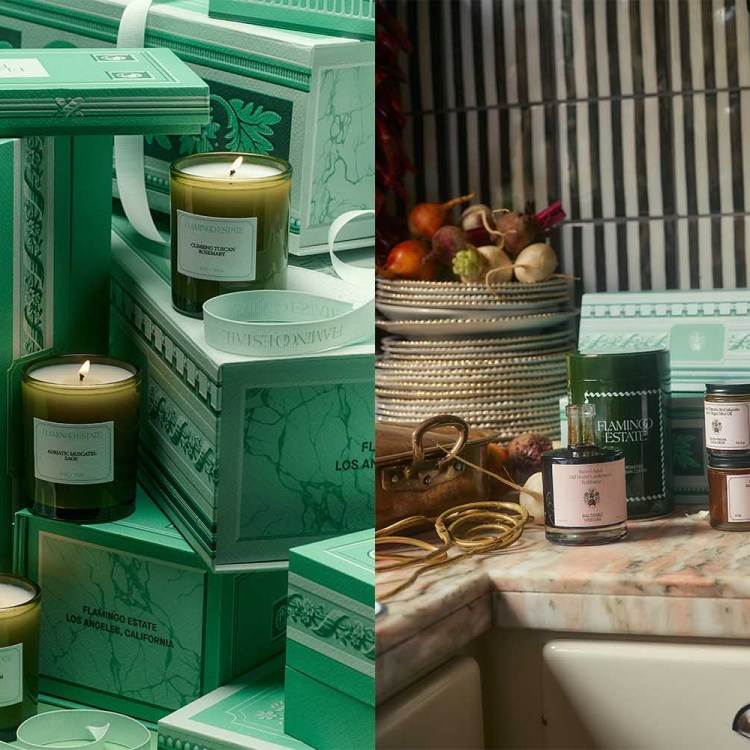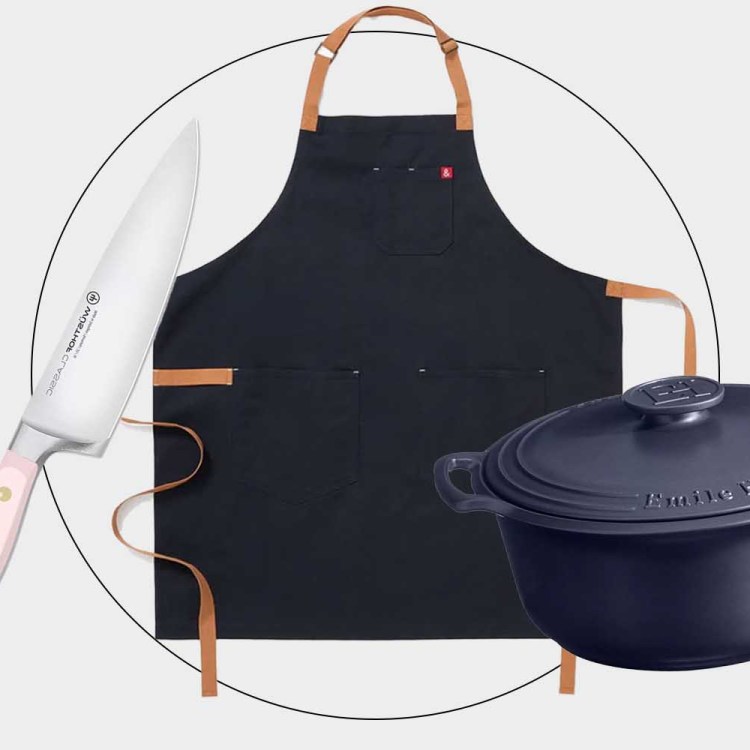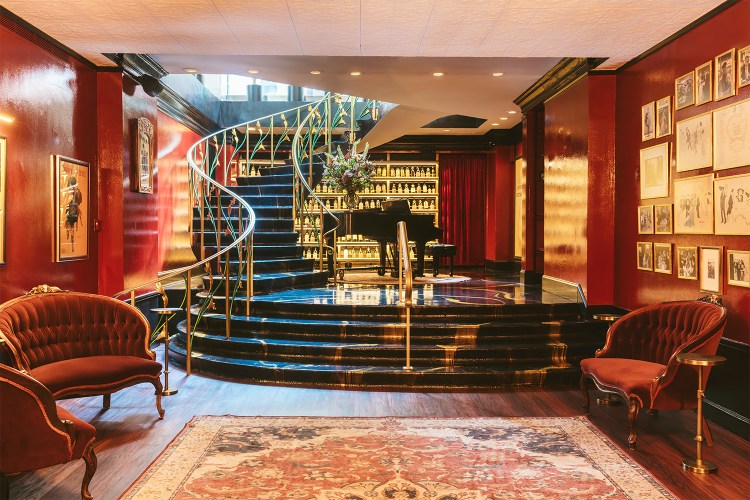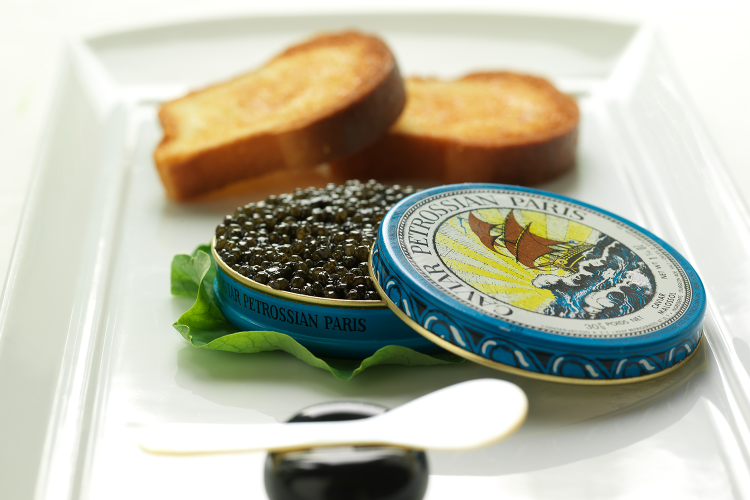Please note: If you buy through the links in this article, we may earn a small share of the profits.
For some coffee drinkers, a quick cup takes precedence over a flavorful cup. But if you’re in it for more than a caffeine fix, pour over coffee offers a brewing method that brings unique and complex flavor notes to your morning routine. The Coffee Folk founder James Hyslop describes pour over as drip coffee brewed manually, but much less forgiving.
Beginners should be aware that brewing pour over can be “quite easy to mess up and you can get a very unpleasant tasting coffee,” says Hyslop. A learning curve and period of experimentation is required to achieve the subtle notes it’s known for. These notes shine because pour over is meant to be drunk black. When brewed correctly it’s “very light and delicate in texture (similar to tea)”, and “bright and interesting” as opposed to heavy like espresso.
Pour-over coffee is a hands-on brewing process, and doing it right requires additional equipment. Pre-ground coffee essentially undermines the point of pour-over, so you need a coffee grinder that will ensure consistent particle size for even extraction. You’ll also need a scale (preferably one with a built-in timer), a gooseneck kettle (a regular kettle won’t work because you must be able to pour slowly and accurately), and a carafe for the coffee to drip into.
Improve Your Coffee Routine
The 7 Best Drip Coffee Machines
Your morning routine just got a lot less complicated.The 8 Best Home Espresso Machines in 2023
Because does Starbucks really deserve this much of your money?6 Coffee Subscription Services for a Better Cup of Joe
They can skip the grocery store coffee from now onOn average, Hyslop estimates that a pour over coffee should take 4-7 minutes to brew (including measuring and grinding beans). The process can vary depending on which maker you choose, but the general gist is as follows: freshly ground beans are doused with a bit of not-quite-boiling water so they can “bloom”. Next, evenly saturate the grounds by pouring the remaining hot water in concentric circles (easier said than done). Manual pouring is the art of pour over and where the process gets its name. But beware — if you pour too quickly the beans will be under-extracted (sour tasting coffee), but taking too long will over-extract (bitter tasting coffee).
Key terms
Bloom: This is a critical step in the pour over coffee process. Hyslop explains that once your filter and fresh grounds are in place, you add a bit of hot water so the grounds can bloom. They’ll look like they’re expanding as the hot water releases carbon dioxide in the beans. Let the grounds sit for about 30 seconds before gradually pouring a controlled amount of water. Keep in mind that this is just a general recommendation — Hyslop notes that one particular V60 recipe calls for two blooms.
Flow Rate: The grind size and pouring technique you adopt will dictate the flow rate for your pour over coffee. General wisdom says a slower rate is better for light roasts, while a faster rate is appropriate for dark roasts.
Other things to consider
Type of opening: Flow rate is also affected by the type of opening in the dripper. A single large hole (conical shaped drippers) is less forgiving for pour over novices because you must control pour speed. For models with multiple small holes (flat-bottom drippers), the speed is essentially dictated for you, so there’s a larger margin for error. Varying your pour technique and speed can change the taste of the coffee even if you’re using the same beans.
Filters: The type of filter you use will affect the flavor of your coffee. Most people prefer paper for pour over. Cloth filters also work well with the pour over method, according to Hyslop, but require slightly more cleanup effort. Metal filters are also possible, but they are more likely to clog oils and over-extract. In contrast, paper filters hold back oils and coffee silt, which makes for a cleaner drink.
The Best Pour Over Coffee Makers
- Best overall: Hario V60
- Best for beginners: Clever Dripper
- Best for experienced brewers: Chemex
- Most consistent: Fellow Stag
- Most Versatile: Yield Pour-Over Glass Carafe
- Best Affordable Option: Public Goods
- Best for Couples: Coffee Registry Brass Duet
Best overall pour-over coffee maker
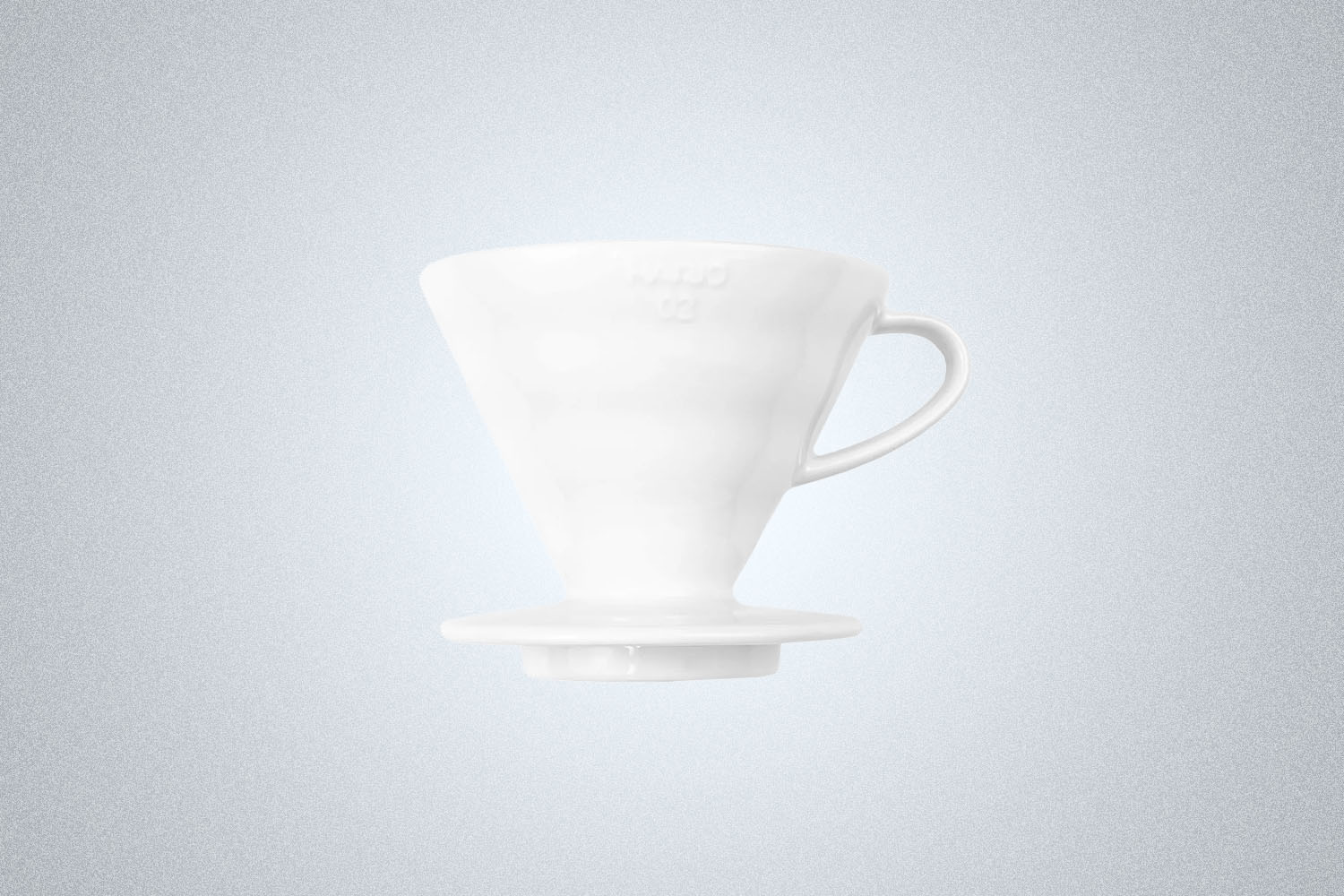
Hario V60
Hyslop’s first recommendation is this “iconic” Arita-yaki style ceramic dripper handmade in Japan. The traditional craftsmanship helps the vessel retain heat throughout the brewing cycle while spiral ridges encourage a layering of grounds that produces an umami flavor. According to Hyslop, cafes and coffee gurus frequently rely on this dripper because it makes a “truly delicious cup of pour over.” That being said, it’s one of the more unforgiving models with a large single hole that could be discouraging for inexperienced brewers. This dripper doesn’t come with a carafe, so depending on which size you choose, place it above an appropriately large vessel.
Key Specs:
• Capacity: 10 oz
• Material: Ceramic
Best pour-over coffee maker for beginners
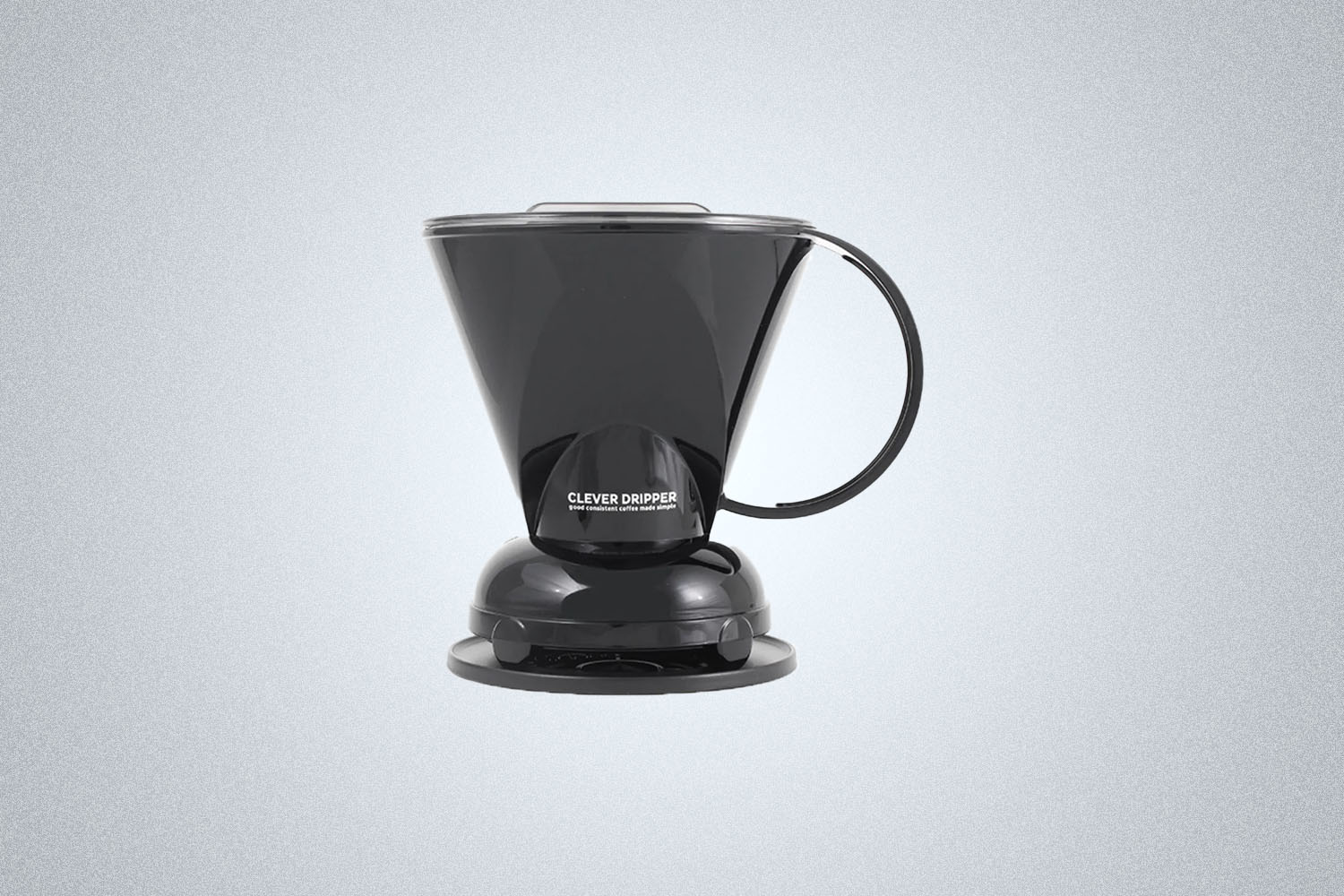
Clever Dripper
The Clever Dripper is a cross between a French press and a true pour over dripper. While this model is used in the pour-over fashion, it’s actually an immersion brewer (French press). This means you don’t need a gooseneck kettle and you can pour the hot water all at once — no technique or finesse required. The plastic dripper uses a convenient “steep and release” design with a pressure plate that you release by placing the brewer on top of a mug (or thermos). A Clever representative warned that you should hand wash the dripper because high heat can lead to micro-cracks in the plastic and a foggy look that can’t be cleaned off. Clever sells “coffeesock” cloth filters which allow more oils through for more body without sacrificing flavor. If you don’t love the idea of reusable filters, any #4 filters will work.
Key Specs
Capacity: 16.9 oz
Material: Plastic
Best pour-over maker for experienced brewers
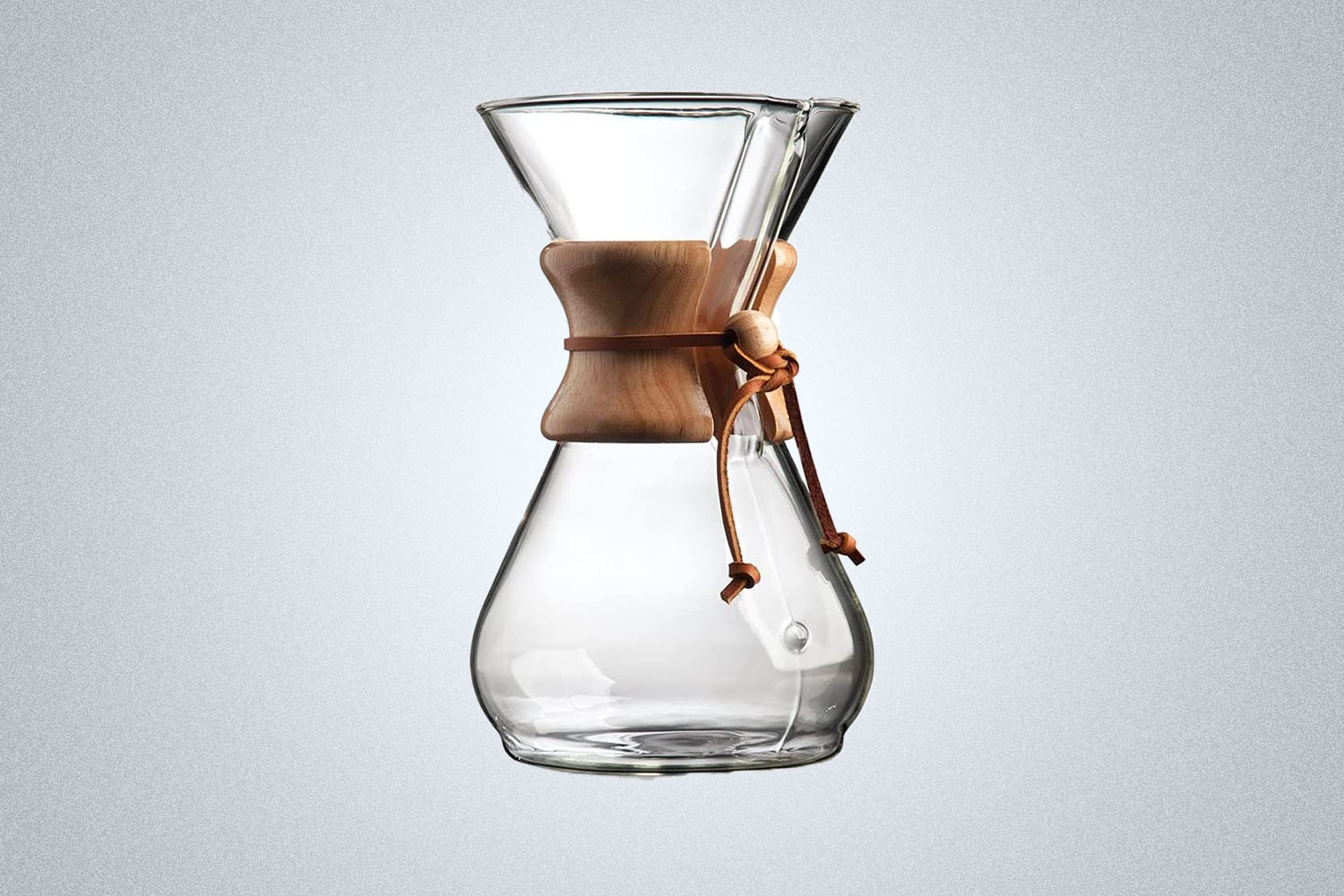
Chemex Pour-Over Glass Coffeemaker 8-cup
Not many pour over makers boast a permanent spot in the Museum of Modern Art, but this Hyslop-approved dripper is, in fact, a MoMA resident. If you’re hosting guests, the sculptural vessel is a wonderful kitchen centerpiece. Its wood collar accentuates the unique shape and allows you to safely pick it up when hot. For entertaining, the 8-cup dripper capacity is optimal for making larger brews because you can cover and refrigerate any leftover for reheating later (it’s 9.6” tall so will most likely fit on your tallest fridge shelf).
If you’ve seen the Chemex on Instagram, you’ve probably noticed brown paper filters that lend the hourglass setup an artisanal look. These double-bonded filters create a thinner mouthfeel (similar to tea) because they keep out more of the grounds’ oils. Hyslop advises that the Chemex is one of the more unforgiving models and should definitely be used with a gooseneck kettle. According to Chemex, you’ll brew the best flavor using medium-coarse grinds (too-coarse and water will flow too quickly, while too-fine will clog the filter).
Key Specs
Capacity: 8 cups (also available in 3, 5, and 13 cup versions)
Material: Glass
Best pour-over maker for consistency
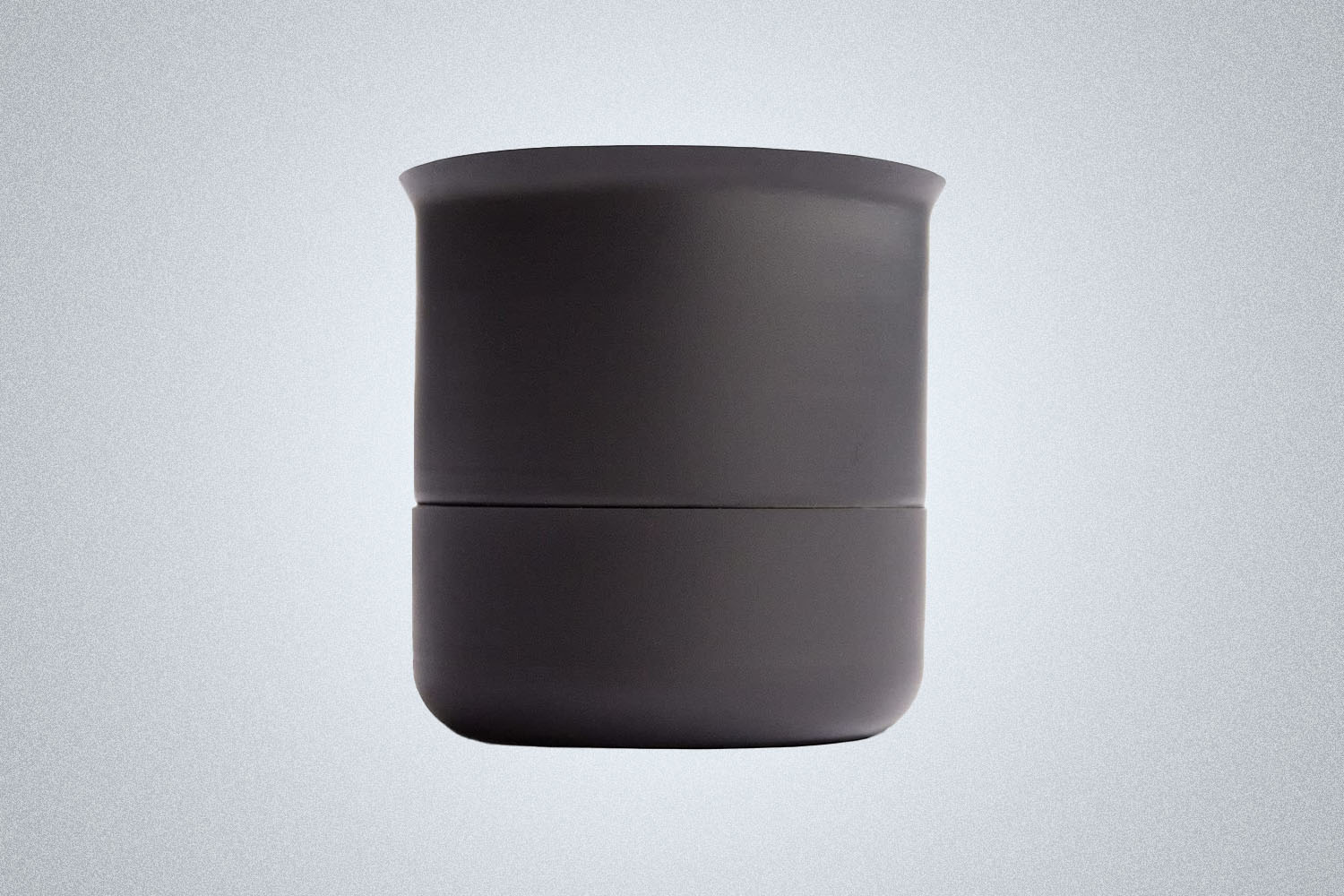
Fellow Stagg Pour-Over Dripper
Hyslop describes pour over as a process that’s “simple to describe but hard to perfect,” so if you’re daunted by the idea of a dripper with a single large hole, this flat-bottomed model will set your mind at ease. The Stagg X has a bump pattern with ten small holes designed to brew consistently and prevent clogs. You can expect a flavorful cup thanks to the dripper’s steep slope, which boosts extraction by increasing coffee-to-water contact. For those who are particular about temperature, double-walled stainless steel and vacuum insulation retain heat superbly (while remaining cool to the touch). Pour over beginners will appreciate the ratio aid that’s built into the drip catcher and can help measure out the exact amount of grinds for one or two servings.
Key Specs:
Capacity: 10 oz
Material: Stainless steel
Most versatile pour-over maker
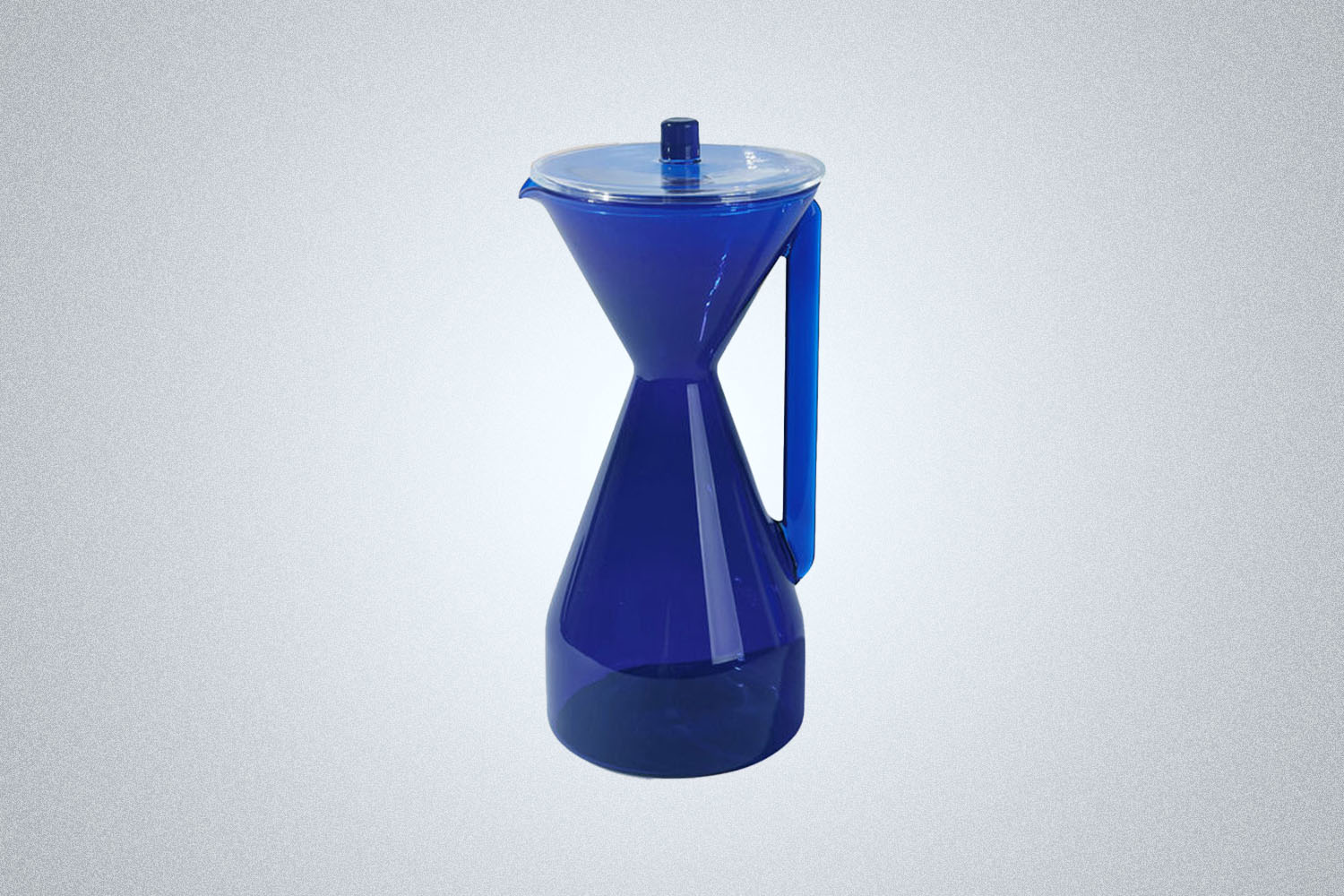
Yield Pour-Over Glass Coffee Carafe
If you’re searching for an eye-catching pour over maker that isn’t as recognizable as the Chemex, try this beautiful borosilicate glass model from Yield. Despite its delicate appearance, the material is resistant to thermal shock and retains heat superbly. The dripper-carafe combo conveniently becomes its own serving vessel when you remove the filter after brewing. You can use Chemex brand filters, other paper filters, or metal filters. It comes in five striking colors (including amber, verde, and cobalt), but if you’re gifting it for a housewarming, stick with clear to be safe. You can brew between 1-6 cups at a time and use the included lid to store leftover in the fridge. When you’re not using it to brew coffee, it can be used for tea, sangria, lemonade or spa water.
Key Specs:
Capacity: 6 cups
Material: Glass
Best affordable pour-over coffee maker
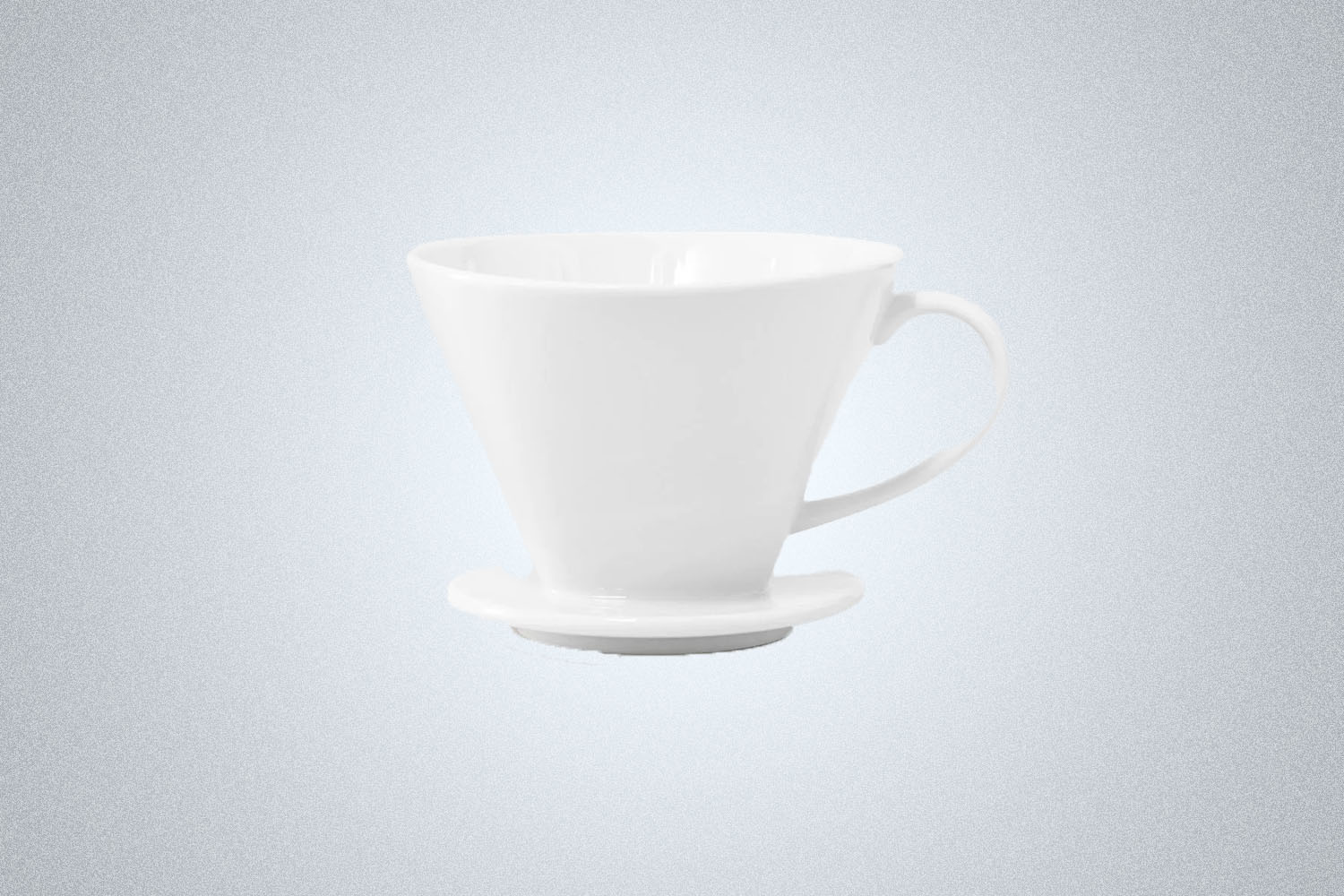
Public Goods Pour-Over Coffee Maker
Despite its budget-friendly price, this porcelain dripper has a hefty weight that makes it feel solid. The design fits over any 15 oz mug, but if you want to keep consistent with the clean lines of this minimalist piece, you can complement it with a matching Public Goods mug. The flat bottom has four small holes to regulate flow rate and the sides of the cone have thin ridges to encourage layering of grounds. Like most drippers in this list, you can use standard #4 coffee cone filters. The porcelain is high-fire, which means it won’t stain or crack and, unlike some other models, this one is completely dishwasher safe so cleanup is a breeze.
Key Specs:
Capacity: 15 oz
Material: Porcelain
Best pour-over maker for two people
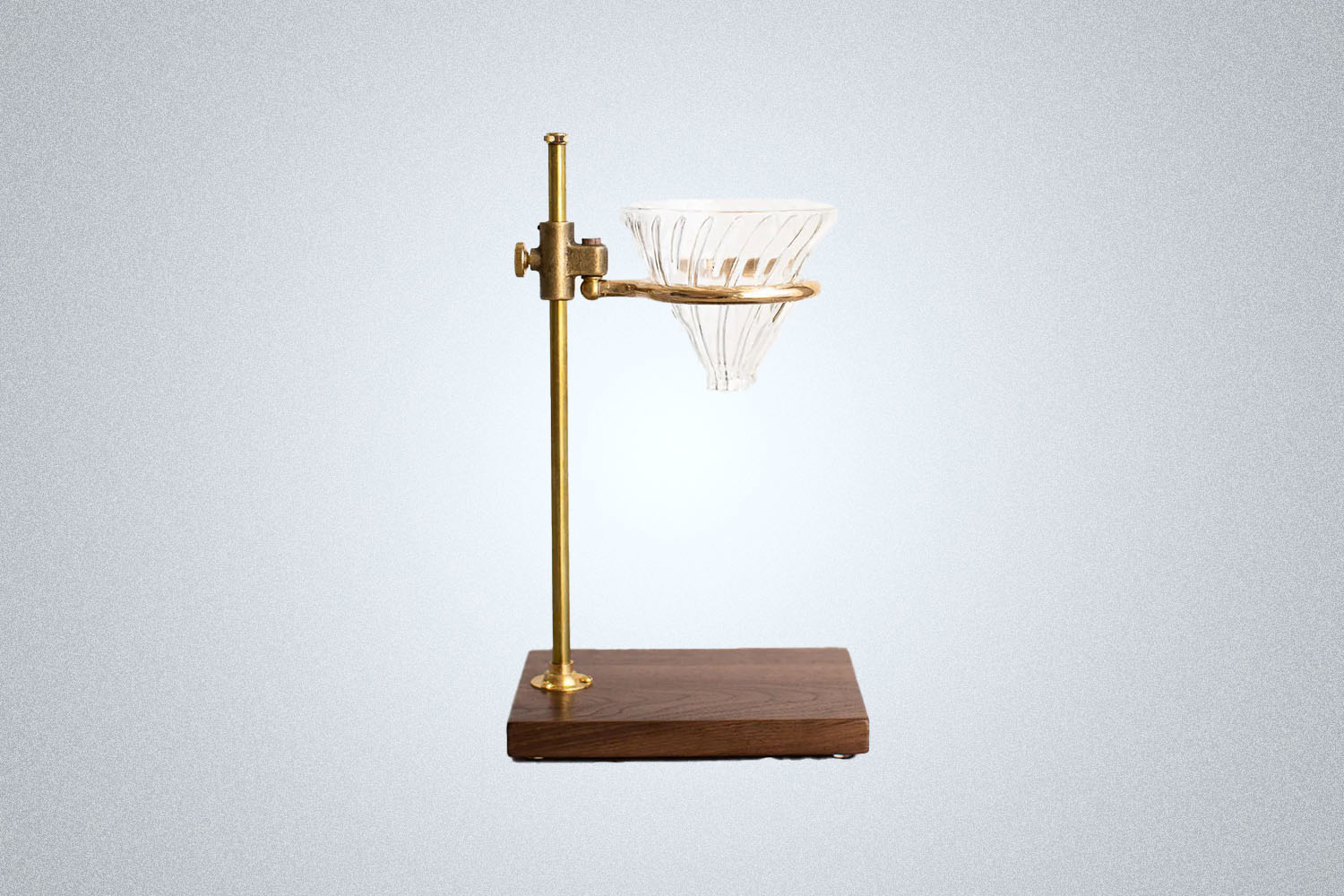
Coffee Registry Brass Duet
Observant readers may notice that this Hario model already appeared above—but this take on the V60 warrants its own entry. A very different look from the French Country style ceramic dripper, the design of this duet was inspired by chemistry lab implements. A walnut base keeps the brass stand steady, on which you can adjust the height of the two V60s (included in the price of the dripper). It’s an excellent solution if you’ve found yourself tussling over a dripper with a roommate or partner. Just like the ceramic V60, the glass version has the same 60° conical angle, but the ridges are known to be slightly deeper. If you feel like experimenting with different materials, you can try using the brass holder with steel or copper V60s.
Key Specs:
Capacity: 4 cups (2 cups per dripper)
Material: Glass
We've put in the work researching, reviewing and rounding up all the shirts, jackets, shoes and accessories you'll need this season, whether it's for yourself or for gifting purposes. Sign up here for weekly style inspo direct to your inbox.
